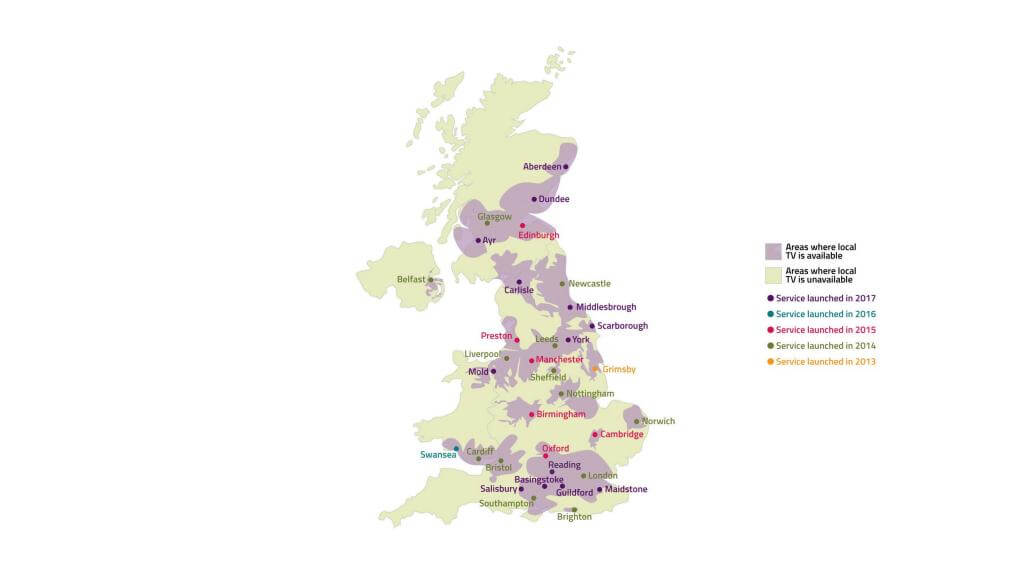The fate of 32 of the 33 local TV channels broadcasting in various parts of the UK is yet to be publicly confirmed by Ofcom.
- Only one local TV channel has had its licence renewed so far.
- Ofcom tasked at scrutinising local channel’s compliance histories and financial position to provide a service into the mid-2030s.
- All remaining local TV licences currently expire in just over one year.
The long-term viability of local television broadcasting on Freeview remains in question, following a decade in which few local channels have achieved any significant impact.
To date, only Brighton-based Latest TV has received Ofcom approval for a licence extension into the 2030s. All other local channels continue to await decisions on their future. Additionally, Ofcom has also granted a licence renewal to Comux, the organisation responsible for distributing local TV signals on Freeview.
Originally envisioned as an alternative to BBC and ITV regional news, the local TV initiative spearheaded by former Culture Secretary Jeremy Hunt began rollout from 2013. At its peak, 34 local channels were operational. That number has since declined to 33, with all but two now controlled by either That’s TV or Local TV Limited – two dominant operators whose output has shifted away from locally focused content.
All local TV licences were initially set to expire on 25 November 2025. However, legislation passed in late 2024 enabled Ofcom to consider renewals. To allow time for thorough review, Ofcom granted a one-year extension to all channels that applied, pushing the expiry date to 25 November 2026.
These licences permit operators to broadcast via Digital Terrestrial Television (DTT), more commonly known as Freeview.
Renewal process triggers exits and closures
Nottingham’s Notts TV opted not to apply for renewal and ceased broadcasting at the end of August 2025. Unlike other local TV operators, the channel’s management chose not to sell its licence or assets. It is currently unclear if any other applicant for the Nottingham local TV licence exists. The infrastructure to broadcast local TV from the regional transmitter is still on air.
Following Ofcom’s announcement in October 2024 that it would scrutinise applicants’ financial stability and long-term plans as well as their compliance record, three local TV operators sold up. London Live shut down in January 2025. Its licence was acquired by Local TV Limited. Belfast’s NVTV and Sheffield Live TV were both sold to That’s TV, the UK’s largest local TV operator in terms of the number of local TV licences is holds. NVTV’s deal with That’s TV, first announced in April, allows the community broadcaster to continue slotting programmes into That’s TV Belfast. However, NVTV subsequently confirmed that there was a delay in getting NVTV content back on the channel until That’s TV had “fully” set up their operations in Belfast.
These channels join a list of other local TV channels that have either come under new ownership or closed, and reopened under a new owner.
| Channel | What happened? |
|---|---|
| Big Centre TV (Birmingham) | Licence transferred to Kaleidoscope TV after original owner went into administration. Subsequently sold to Made Television, now Local TV Limited |
| Bay TV Liverpool | Licence transferred to Made in Liverpool, now part of Local TV Limited, after original owner went into administration. |
| Cambridge TV | Local channel sold to That’s TV. Cambridge TV continues as a production company. |
| Estuary TV (Grimsby) | Sold to That’s TV. |
| Mustard TV (Norwich) | Sold to That’s TV. There was a three month gap between Mustard closing and That’s TV Norfolk starting. |
| STV2 | STV’s chain of local channels that became STV2, serving five locations in Scotland, was sold to That’s TV in 2018. STV2 closed on 30 June, That’s TV Scotland launched 15 October. |
| Swansea Bay TV | Sold to That’s TV |
Two operators dominate
That’s TV has had a chequered past with Ofcom over compliance matters. Ofcom previously found the broadcaster failed to produce any locally originated news for one of its channels over a 12-month period. The company has replaced local newsrooms with centralised production and now primarily simulcasts its national classic entertainment channel across its local services.
Local TV Limited, the second-largest operator, briefly carried Talk TV before reverting to a simulcast of True Crime (formerly CBS Reality). Like That’s TV, it has consolidated its news operations, moving away from newsrooms and studios in the areas it serves.
The last remaining independent local TV broadcasters are Brighton’s Latest TV and KMTV in Kent.
Local News concerns
Ofcom has expressed concern over the quality and quantity of local news content. The regulator has warned broadcasters against practices such as repeating bulletins, simulcasting radio stations, or airing news during off-peak hours. In response, both major operators have extended their evening news slots ahead of licence renewal decisions.
Despite these adjustments, neither operator has succeeded in challenging the dominance of BBC and ITV in local news provision. As audiences increasingly migrate online, both companies have been slow to adapt. Local TV Limited has recently revived its YouTube presence, while That’s TV relies on syndicated content from local news websites.
With local programming now comprising only a small fraction of overall output, Ofcom faces a critical decision: whether or not to renew licences for services that largely replicate content already available elsewhere on Freeview.
Ofcom has indicated it will not publish renewal applications nor invite third-party comments. The regulator no longer publicly publishes its decisions over local TV licence transfers.
By: Marc Thornham | Image: Ofcom

